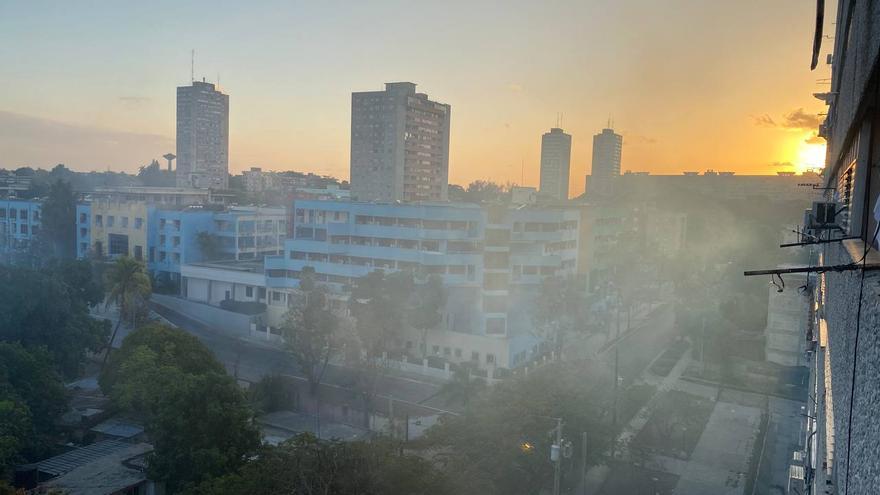
![]() 14ymedio, Havana, 7 July 2022 — Heat, rain and lack of fumigation are the perfect combination for the Aedes aegypti mosquito to do its thing. That scenario, positive for the main vector that transmits dengue fever in Cuba, seems to be happening this summer on the island where the crisis and the climate have come together dangerously.
14ymedio, Havana, 7 July 2022 — Heat, rain and lack of fumigation are the perfect combination for the Aedes aegypti mosquito to do its thing. That scenario, positive for the main vector that transmits dengue fever in Cuba, seems to be happening this summer on the island where the crisis and the climate have come together dangerously.
In one of the highest floors of a Soviet-era building, on Calle Boyeros y Conill, Maria Karla’s family has no respite. “Not many mosquitoes come here but this summer we are full of welts everywhere,” she tells this newspaper as she shows the bites on her thighs, feet and arms.
The area, near the Council of State and with a lot of vegetation, was continuously fumigated until a few years ago by devices located in trucks or by Public Health employees carrying a motorcycle-backpack. “That bothered us a lot because they came every week, they invaded our privacy and my two children’s allergies shot up, but this is worse,” adds the 32-year-old mother.
On the ground floor of María Karla’s house, the puddles of water spread due to the afternoon downpours that are frequent in the Cuban summer. “Before, they used a product, Abate, to kill mosquito larvae in those places where the water accumulated, but they already told me at the family doctor’s office that there isn’t any.”
On Tuesday, dengue sneaked into the daily meeting of the Temporary Work Group in the capital, reports Tribuna de La Habana. Dr. Yadira Olivera Nodarse, director of the Provincial Center for Hygiene, Epidemiology and Microbiology, commented that in June “the level of reactivity of the virus” rose and that “in the current month this epidemiological scenario could be maintained due to weather conditions favorable [to the mosquito].”
“Given the increase in the incidence of the virus, it was decided that all patients with fever should be considered as suspected of having the disease and they will be permanently monitored,” the local newspaper announced, adding that “474 soldiers of the Youth Labor Army will work in the 27 Health areas with the greatest epidemiological complexity,” a workforce made up of recruits from the Military Service.
“I prefer that my grandson is fighting against the mosquitoes than they send him to beat me up in the streets, as happened to the recruits on July 11,” ventures a grandmother who this Thursday was reading the article in the Havana newspaper while waiting in a bus stop. “Ultimately, when it comes to vector control, they always find a moment to escape and go through the house.”
Despite the fact that it is not to the liking of many to open their homes, let strangers pass and allow a fumigation that often leaves strong odors on the sheets, clothes and walls, as well as fuel stains on the floor, dangerous for being slippery, many miss fumigation because in the absence of the deafening noise of motorcycle backpacks, the buzz of mosquitoes gains ground.
The authorities reported, according to the official press this Thursday, that for the second year Cuba broke the 15 year record for Aedes aegypti reproduction points in and described the epidemiological scenario on the island as “complex.”
The number of documented outbreaks so far in 2022 increased by 21.7% compared to the same period last year, which had already registered the largest number of breeding points for transmitting mosquitoes in the last three decades.
The provinces of Havana, Camagüey, Las Tunas and Holguín have declared transmission of the disease, the State newspaper Granma reported in statements by Madelaine Rivera, national director of Surveillance and Anti-Vector Control of the Ministry of Public Health.
Rivera also pointed out that Havana (16.5%), Holguín (13.5%), Santiago de Cuba (13%) and Camagüey (11.8%) have the highest rates of outbreaks, while 17 municipalities accumulate almost the 61% of the total mosquito breeding sites.
In addition, Rivera pointed out that eight out of 10 outbreaks are detected in water tanks to store water inside homes.
Despite the figures, the Ministry of Health called for calm and assured that “there are still no indicators that demonstrate the presence of a dengue epidemic in the country.”
____________
COLLABORATE WITH OUR WORK: The 14ymedio team is committed to practicing serious journalism that reflects Cuba’s reality in all its depth. Thank you for joining us on this long journey. We invite you to continue supporting us by becoming a member of 14ymedio now. Together we can continue transforming journalism in Cuba.
